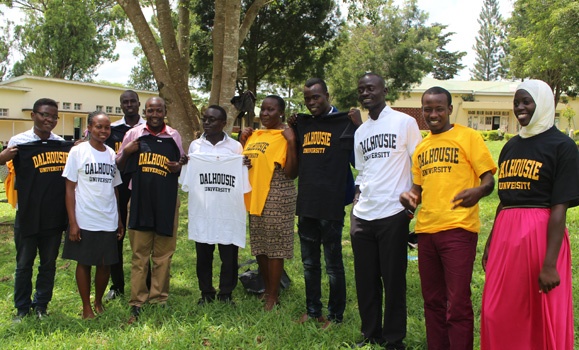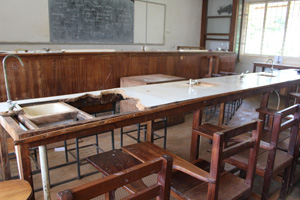News
» Go to news mainFrom Truro to Bukalasa

Article by Philip Moscovitch
Faculty of Agriculture leads new skills development project in Uganda
It’s been nearly a week since she came back from Uganda and Suzanne Johnson is still jet-lagged. Suzanne was there as part of a team laying the groundwork for an exciting new international collaboration with Bukalasa Agricultural College, the East African country’s top Agricultural Technical Vocational Education and Training Institute.
Over the next three and a half years, the Faculty of Agriculture will work closely with BAC and industry partners to develop new competency-based curriculum focused on practical skills. The effort is part of the five-year, US $100 million Uganda Skills Development Project, funded by the World Bank, to overhaul education and deliver training programs geared to meeting the needs of industries, including agriculture. The funding is in the form of a World Bank loan administered through the country’s Ministry of Education and Sport.
“It’s a wonderful project. Dalhousie is a partner in building tomorrow’s Uganda,” says distinguished humanitarian Narinder Sharma, who was hired by the Faculty of Agriculture to oversee an advance team preparing for the launch of the project. Sharma, who spent decades working for UNICEF (including five years in Uganda), says agricultural education “has always been a challenge” there. The population of 40 million is mostly rural, with subsistence farmers making up most of the workforce.
“It really is a transformational process,” Johnson says. “Bukalasa will become the leading agricultural college, and the intention is for them to develop the skills and capacity to train others, so smaller colleges and vocational technical institutes will come to them to learn.”

“Now we're finding there’s this labour shortage. There’s a gap in a lot of industries where they don't have youth that actually have the skills to facilitate the work that's needed within the farming industry,” Johnson says. To meet that need, the country is refocusing on Technical Vocational Education and Training Education.
And that’s where Dalhousie comes in.
A team currently in Uganda includes Faculty of Agriculture members Lana Bos of Extended Learning and Joy Galloway-Jones, who manages co-op and internship programs. The Uganda Skills Development Program is meant to address real-world needs. So before creating curriculum, the Dal team needs to thoroughly understand those needs. So far, their research has been well-received. Speaking in late February, Johnson says, “This week we are in the process of meeting a lot of different stakeholders in the country and doing a labour market consultation process. We’re looking to evaluate what industry believes is most critical, and where there’s the greatest opportunity for growth. We think probably there’s going to be one program in plant science, one in animal science, and another in food production.”
The project is multi-faceted though, extending far beyond curriculum, to operations and physical assets too, helping BAC become a Centre Of Excellence.
“We will be looking at developing greater leadership, reviewing their operations and business plans, looking at their strategic initiatives and aligning them to the larger national strategic objectives and regional objectives, especially within the East African corridor and with the African Union,” Johnson says. “We're also responsible for providing guidance in engineering, materials and equipment because in support of the new curriculum the institution itself will be revitalized.”

In addition, the Dal team will be setting up a small business incubator modelled on the Cultiv8 program in Truro, which is funded by Dal and the provincial government.
Once the new curriculum has been developed, a core team of 15 instructors from Bukalasa will come to Truro to update their skills. Then they’ll be able to train others to deliver the educational program more widely. Ultimately, 1,500 of the 2,000 students at Bukalasa annually should “directly benefit from the new program, whether that be through one of the diploma programs, a shorter certificate course, or the entrepreneurship program,” Johnson says.
Johnson, an engineer by training, provided consultation on the college’s buildings, constructed by the British nearly a century ago. “I have to tell you, the British built really strong infrastructure. The structures are quite stable, and we will incorporate the new infrastructure with the existing buildings.”
Development projects can go awry when they’re implemented by outsiders who don’t understand local conditions and challenges. That shouldn’t be an issue here.
“One of the things that’s innovative about this project is that it really is a twinning,” Johnson says. “We work in complete partnership and solidarity. We’re there to assist and guide and train the administration and staff of the institution in order for them to lead the project.”
Sharma met extensively with government and industry stakeholders in Uganda last November, “getting everybody on board, making arrangements with the ministry and the World Bank, and making sure the Dal faculty knows the situation on the ground at the college in Bukalasa and in the country context: What does the private sector look like? The agricultural sector as a whole? What is the chamber of commerce doing?”
One thing came across very clearly, he says: “People are really excited about this project.”
Recent News
- Fall Food Drive
- Immersive Learning in Digital Agriculture ~ PEI High School Students Experience Virtual Livestock Farming
- Regenerative Agrourbanism
- MacRae Library Student Research poster competition
- Senator Colin Deacon recognizes Jolene MacEachern with King Charles III Coronation Medal
- AC graduates driving innovation and growth in the Dairy Industry with Lely North America
- Homecoming 2024 Photo Recap
- Hall of Fame inducts four new members
